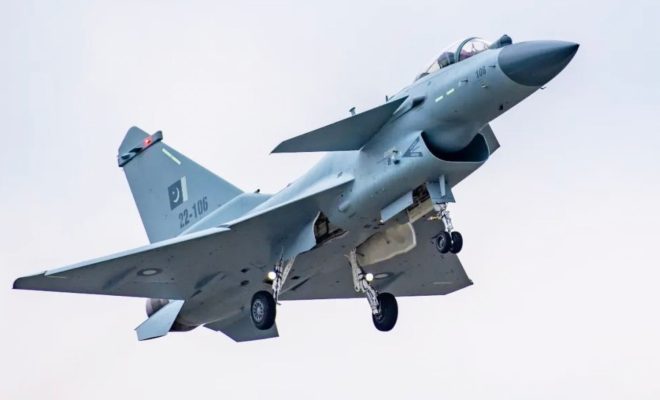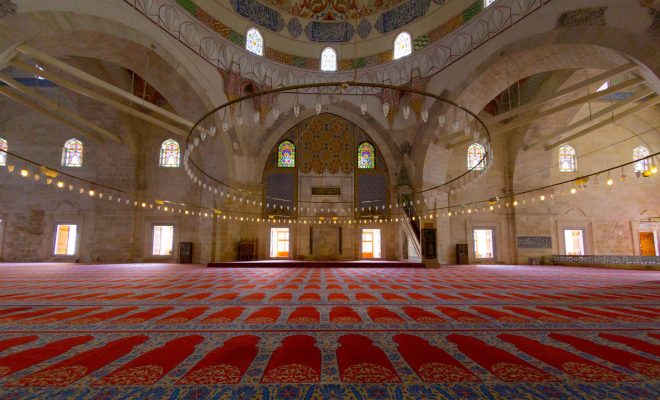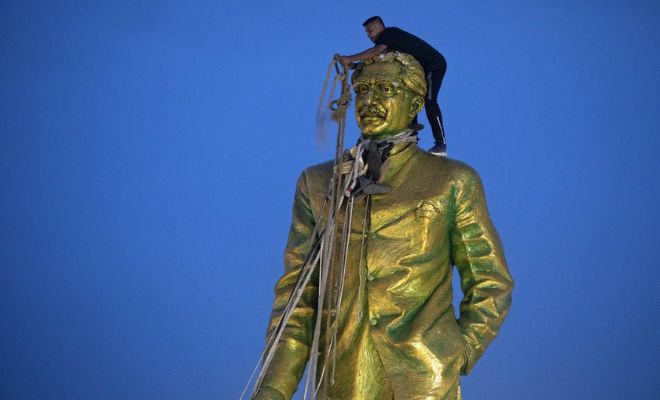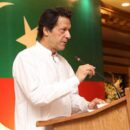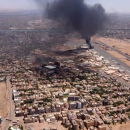Bangladesh: Islam Must be the Only Vision for Change
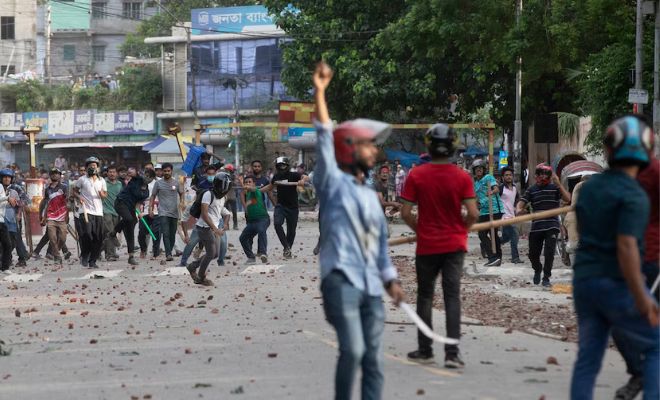
Since the start of July, the youth of Bangladesh have been taking a stand against the corrupt and oppressive regime of Sheikh Hasina. As of July 23, 2024, news outlets report that nearly 150 people – mostly demonstrators – have been killed by the regime. However, observers say that these numbers likely represent the floor – i.e., by the time this article is published, actual casualty figures will be much, much higher.
Now, the youth of Bangladesh are not just calling for fairness in the job quota system or even economic fairness. Rather, they are demanding for the end of the Sheikh Hasina regime – an important call, one with significant hope and opportunity if the youth of Bangladesh tightly hold to their Islamic principles. Indeed, Islam is the only key to unlocking Bengal’s true potential.
Background of the Bangladesh Youth Protests
The demonstrations began with university students protesting against Bangladesh’s job quota system, which reserves 56% of government or public sector job openings to the descendents of 1971 war veterans. In reality, however, the regime exploits the quota system to fill the state with its Awami League loyalists, i.e., strengthen its grip on the country and steal its resources.
Thus, the issue for the Bangladeshi youth was not about the job quota system in itself, but the reality of widespread corruption and oppression by the current regime. Therefore, the youth are now calling for the removal of Sheikh Hasina and the Awami League.
Not only does this regime have a strong grip on the government and state, but it also interferes in universities (and youth affairs in general) through its student wing, the Chhatra League. The Chhatra League often enforces the Awami League’s interests through violence and thuggery.
Consequently, the regime – and its Chhatra League thugs – inflicted brute violence against the students, resulting in scores of deaths and injuries. Moreover, the local media are hesitating to report the true extent of the casualties, and are largely underreporting the actual scale of these protests. Echoing the experiences of the Ummah in Syria and Egypt, the youth in Bangladesh are relying upon the Ummah to keep a spotlight on the situation, preserve the truth of Hasina’s oppression, and carry their message of real change.
The Rulers Hate the Ummah. It’s Time to Reject Them.
Be it Tunisia, Algeria, Egypt, Libya, Syria, Iraq, Jordan, Palestine, Yemen, Iran, Afghanistan, Pakistan, and now Bangladesh, the story is the same. The rulers hate the Ummah, and the Ummah, at varying points in history, rejected them.
Our rejection of the rulers is natural and should be expected. These rulers were imposed upon us by the Colonialist powers (namely Britain, America, and France) to control our lands, exploit our resources, and shed our blood to advance Western interests.
This reality is clear for everyone to see. The Saudi regime was ready to splurge $110 billion on weapons from America because Trump had “asked” for it. Yet, where was this wealth (belonging to the Ummah no less) to solve hunger and poverty in our lands? The generals in Pakistan are ready to “fight terrorism,” but they look the other way to the Indian Army assaulting our sisters in Kashmir. The dictator in Egypt knows how to “be tough” on political opponents, but where is that ‘toughness’ against the Zionist Entity that occupies Muslim land and spills Muslim blood?
It has been no different in the lands of Bengal at the hands of its ruling regimes, be it the current one of Sheikh Hasina or the one before it of Khaleda Zia. The regime in Bangladesh is ready to give strategic and economic concessions to India at the cost of the people in Bangladesh, but it is never ready to support the calls to protect the Rohingya in Burma.
It is with impeccable consistency that the regimes ruling the Muslim lands can easily slaughter Muslims, but are never – with no exception – present to defend the Ummah, especially against the repression of other states, like India, China, America, and so on.
Once again, the Ummah has risen up against a regime, this time in Bangladesh. However, it is critically important that the youth in Bangladesh not just call for the removal of Hasina and the Awami League. Rather, they must carry a vision for “what comes next” by demanding Islam – and nothing else – to once again rule Bengal.
Background on Bangladesh (and Bengal)
Before British Colonialism, Bangladesh – and the region of Bengal at large – was an economic hub of the Mughal State. In fact, it had been the Mughal State’s wealthiest province, resulting from a powerful mix of widespread agriculture and manufacturing, including shipbuilding! The region built its wealthy status upon productivity, trade, and advancement. And South Asia was the economic engine of the world, putting Bengal’s prosperity at the top, globally speaking.
Bengal was stripped from its wealth – and its prestige – by the British, who ruled the region for 300 years in a brutal way. The loss of Bengal’s wealth was no accident; it was by design, and done with the goal of inflicting pain upon the Ummah. This was obvious through the decades when Britain dismantled India’s manufacturing, forcing it to import costly Western goods such that it would lose gold (to finance trade) and become poorer. One of the worst chapters of this policy came ahead in 1943 when – due to a combination of many British economic policies – a single famine killed three million people in Bengal!
Britain had directly ruled Bengal – and South Asia at large – until 1947. It then left its tools to manage affairs on its behalf. The regime of Sheikh Hasina is a continuation of this legacy; it does not value Muslim life nor advance the Ummah’s interests.
Like the rest of the Ummah, the people of Bengal wielded strength and saw prosperity when they implemented Islam in every aspect of life – i.e., political, economic, social, religion, legal, and governing. In fact, whenever the Ummah gave honour to Islam, Allah (SWT) elevated the Ummah to stand above its enemies, without exception.
The second khalifah (caliph) of the Ummah, Umar ibn al-Khattab (RA), said:
“We are a people who Allah has honoured with Islam. And whenever we seek to be honoured through other than it, Allah will bring us humiliation.”
This is an important statement. Seeking honour through Islam is not optional; if the Ummah tries seeking honour through other ways – such as patriotism, democracy, secularism, tribalism, etc – then Allah (SWT) will humiliate us. He (SWT) will humiliate us until we return to the right path.
Islam is the Only Path to Real Change
Obeying Allah (SWT) in all matters – including political matters – is an obligation, just like Salah (prayer), Sawm (fasting), Zakat, or Hajj. It is part of the pledge we make to Allah (SWT) when we say the Shahadah, i.e., to recognize that there is no ilah but Allah (SWT). Indeed, Allah did not create humankind and jinns except to worship – i.e., obey – Him.
Allah (SWT) said:
“I did not create jinn and humans except to worship Me.” (Qur’an – 51:56)
In terms of ruling (e.g., political affairs, economics, etc.,) Allah (SWT) said:
“O believers! Obey Allah and obey the Messenger and those in authority among you. Should you disagree on anything, then refer it to Allah and His Messenger, if you ˹truly˺ believe in Allah and the Last Day. This is the best and fairest resolution.” (Qur’an 4:59)
“Obey Allah and obey the Messenger and those of you in authority.” (Qur’an – 4:59)
“Have you not seen then one who claims to believe in what Allah has revealed to you and what was revealed before you; go and seek judgement from the Taghout, whilst they were commanded to disbelieve in it”? (Qur’an – 4:60)
“And judge between them ˹O Prophet˺ by what Allah has revealed, and do not follow their desires. And beware, so they do not lure you away from some of what Allah has revealed to you. If they turn away ˹from Allah’s judgment˺, then know that it is Allah’s Will to repay them for some of their sins, and that many people are indeed rebellious. (Qur’an – 5:49)
This obligation to rule by Allah (SWT)’s commands takes form in only one way: the Khilafah.
Sahih Muslim reported on the authority of Abu Hazim, who said:
“I accompanied Abu Hurayrah for five years and heard him talking of the saying of the Prophet (saw): ‘The Prophets ruled over the children of Israel, whenever a Prophet died another Prophet succeeded him, but there will be no Prophet after me. There will be Khulafaa’ and they will number many.’ They asked: ‘What then do you order us?’ He said: ‘Fulfil the Bay’ah to them one after the other and give them their due. Surely Allah will ask them about what He entrusted them with.’”
Additionally, Rasul’Allah (SAW) said:
“Whoever removes his hand from obedience will meet Allah with no proof for himself, and whoever dies without the pledge of allegiance upon his neck dies a death of Jahiliyya.” (Muslim)
“Only the Imam is a shield, behind whom you fight and you protect yourself with…” [Muslim]
“If the bay`a (pledge of allegiance) is given to two Caliphs, then kill the second of them” [Muslim]
In these ahadith, Rasul’Allah (SAW) clearly defined that the ruling/authority of Muslims should be with a single Khalifah. In fact, following the death of Rasul’Allah (SAW), the Sahaba (RA) saw to it that the Ummah was ruled by a single Amir/Khalifah, starting with Abu Bakr (RA). In turn, the Ummah maintained this system for over 1,300 years, i.e., obeying one Khalifah while ruling by Islam in their lands, from the east in Southeast Asia to the west in the Maghrib.
Aim for Changing the World, Not Only Bengal
The strength of the Islamic vision for change is that it is not limited to improving Bangladesh or Bengal, but rather, changing the world. Today, the youth of Bangladesh should not just be taking a stand to lead change in Bangladesh, but rather, they should take charge of leading the world – i.e., the Muslim lands and beyond.
Indeed, Rasul’Allah (SAW) promised that the Khilafah will return, and it will return as a Khilafah Minhaj an-Nabuwa (i.e., “upon the Prophetic method.”) So, the victory is coming regardless, but this struggle – like all struggles of the Ummah – is an opportunity to take leadership and earn the honour, just like the Ansar (RA) did at the time of Rasul’Allah (SAW).
“There will be Prophethood for as long as Allah wills it to be, then He will remove it when He wills, then there will be Khilafah on the Prophetic method and it will be for as long as Allah wills, then He will remove it when He wills, then there will be biting Kingship for as long as Allah Wills, then He will remove it when He wills, then there will be oppressive kingship for as long as Allah wills, then he will remove it when He wills, and then there will be Khilafah upon the Prophetic method” and then he remained silent.” [Ahmed]

